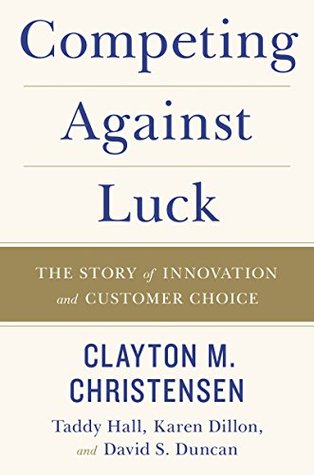More on this book
Community
Kindle Notes & Highlights
People weren’t hiring Airbnb only because it’s a place to stay. They
were hiring Airbnb because having a place to stay allows them to be someplace so they can participate in something in which they want to be part—and because it offers a more authentic local experience than a cookie-cutter, one-size-fits-the-world hotel chain.
Brian Chesky’s
stack up
The circumstances in which consumers would hire Airbnb are very different from those in which they’d hire a
Reid Hoffman.
It’s important to note that we don’t “create” jobs, we discover them.
Adopting new technologies can improve the way we solve Jobs to Be Done. But what’s important is that you focus on understanding the underlying job, not falling in love with your solution for it.
For innovators, understanding the job is to understand what consumers care most about in that moment of trying to make progress.
Understanding the circumstance-specific hiring criteria triggers a whole series of important insights, perhaps most notably that the competitive field is likely completely different from what you might have imagined.
functional
emotional
social,
Netflix CEO Reed Hastings
The competitive landscape shifts to something new, maybe uncomfortably new, but one with fresh potential when you see competition through a Jobs to Be Done lens.
BMW
With demand for green fuel-efficient cars becoming a top priority
a trend toward urbanization,
fewer young people bothering to get their driver’s license at all, BMW realized the real job was mobility
“We needed to start benchmarking outside of our category.”
“We’ve changed from a supply side perspective to a demand side perspective,”
says—in effect, shifting from selling products to responding to jobs. That framing itself was a sea change for an auto manufacturer used to seeing its dealers as its primary customers.
And BMW is not alone.
The race is clearly on to determine who best understands consumers’ Jobs to Be Done.
General Motors (GM)
Lyft,
Think of the path ahead through the lens of Jobs
Competitive advantage will be granted to whoever understands and best solves the job.
Daniel Bernoulli
Bernoulli’s principle
Cost or efficiency is not a core element of a job.
A theory is essentially a proposition: we propose this set of processes will help develop innovations that will be successful.
we believe Jobs Theory will make an enormous difference in the quest to shift innovation from a game of chance to a predictable endeavor.
It wasn’t until the sixteenth century, with one simple but profound observation, that Renaissance astronomer
Nicolaus Copernicus
reframed our view of the...
This highlight has been truncated due to consecutive passage length restrictions.
The planets revolved not around the earth, but...
This highlight has been truncated due to consecutive passage length restrictions.
Of course, it took eighteen centuries for someone like Copernicus to see and articulate the flaws in Aristotle’s logic.
Changing a well-established view of the world rarely happens overnight—and even when it happens, it still takes time to refine and perfect the right new perspective.
As you look at innovation through the lenses of the Jobs Theory, what you see is
not the customer at the center of the innovation universe, but the customer’s Job to Be Done.
“What causes a customer to purchase and use a particular product or service?”
Jobs Theory answers this question by asserting that customers purchase and use (or “hire” in our jobs metaphor) products and services to satisfy jobs that arise in their lives.
Do you understand the real reason why your customers choose your products or services? Or why they choose something else instead?
What is competing with your products and services to address these jobs?
Jobs Theory transforms how you define the business you’re in, the size and shape of the market in which you compete, and who your competitors are.
New Hampshire University (SNHU)


